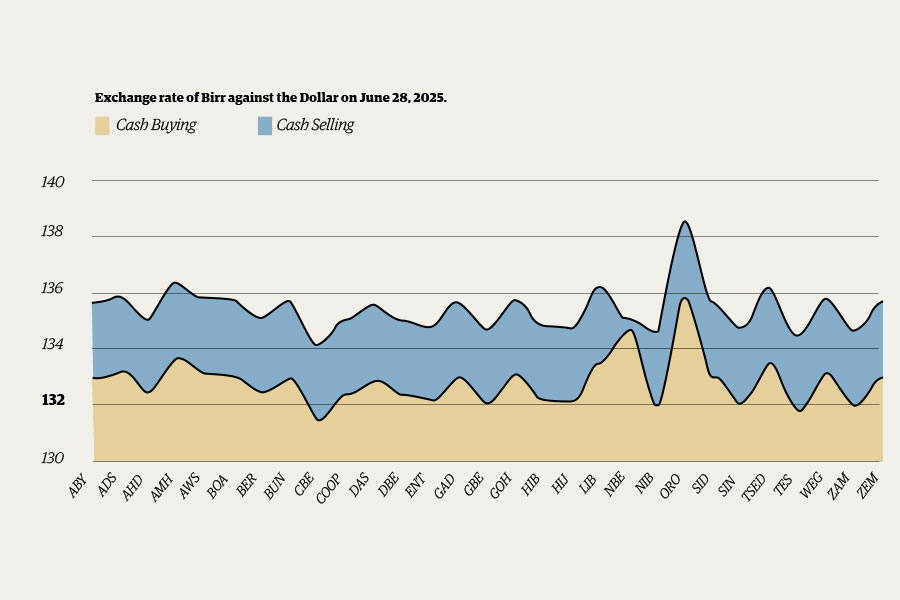
Commentaries | Aug 14,2021
There is a small two-by-three-metre shop right in the heart of Semien Shola Market where Solomon Addis has been selling butter and honey for close to a decade. The shop is small, but there is plenty to choose from for the Ethiopian New Year holiday shoppers.
Butter, the crux of almost all holiday meals, takes up most of the space,as there are three varieties. The fresh one, delivered within three days all the way from the northwestern part of the country, is a bit more expensive than the oldest type there, which has overpowered all the other smells in the tiny shop.
"People prefer the fresh one," said Solomon, who brought 80Kg for sale. He is selling it for 350 Br per kilo, a 50 Br drop in price since the last Easter holiday.
"It's the rainy season, so there's more production. Cows are eating more grass, and we get to have more butter," Solomon said, between dolling out a few kilograms to a customer.
The less popular older butter, lega qibe [fresh butter], is going for 280 Br a kilogram. There is also less of it to sell – 60Kg. He is changing spoons to serve everything from butter to cottage cheese and occasionally scoop out a bee enveloped in the honey jar, serving customers at full tilt. His shop is one of the hundreds in the busy market crammed with shoppers from all parts of the city.
The narrow corridors throughout the entire market are filled to the brim with holiday shoppers with long lists and no time to spare on September 10, a day before the Ethiopian New Year.
While the Easter holiday saw a lull in activities following the onset of the Novel Coronavirus (COVID-19) in the country in March, it is now back in full force. The only visible difference is the omnipresence of masks on people's faces as they squeeze past each other.
A few hundred metres and several twists and turns away, Paulos Yeshitila is selling the other popular holiday commodity, chickens. His job mainly consists of pulling the hens from their coops and showcasing them to interested buyers. Here, the winner of the popularity contest is the red-feathered chicken, which he was selling for 400 Br to 500 Br.
"You could get a slightly cheaper price in other places," he said. "But the chickens are going to be much smaller in size. Mine are big," he said proudly.
He sources his chickens directly from farmers and is looking to make a 100 Br profit from each one. He and his colleague also provide slaughtering and skinning services for an extra 50 Br.
Eggs are being sold for seven Birr each in Shola Market, up by one Birr from a couple of months go.
"Fewer people can be bothered to do this process at their homes these days," he said.
Edomias Getachew, who has bought two chickens from him, disagrees.
"I need to hear the chickens clucking in the house for the real holiday feel," he said. He has purchased the two chickens at 450 Br each, a 100 Br price increase from the Easter season just a few months ago in April.
"I could have gotten it cheaper too if I had been a few days earlier," he said.
But Edomias and many others like him are stuck running last-minute holiday errands. However, it is not just last-minute shopping that has contributed to the price increases. Inflation, which has been on a steady tear in the country, reached 22.3pc, the highest figure since the beginning of the fiscal year. Though the last month saw the rate decrease to 20pc, prices have still risen significantly.
Sheep, which were sold for 3,000 Br to 5,000 Br last Easter, have gone up to 9,000 Br, and goats, normally priced higher, are being sold for up 12,000 Br in markets across the city.
"We've decided to go with two chickens instead this year," joked Edomias.
But even eggs, which were priced at six Birr a couple of months ago are now seven Birr.
An option that many take across the city is buying an ox and splitting the cost and the meat between multiple households. The price for oxen has not shown a distinct increase. An ox can be purchased for 20,000 Br to 45,000 Br, depending on how fattened it is and the origin of the cattle.
Up north in Jan Meda, the popular sports-ground-turned-vegetable-market is not as busy on the eve of the New Year. The market is not crowded like Shola, but this is mainly due to the vast size of the place.
The remains of a sports field that spans over two kilometres sits on one side. It was changed to accommodate the tight-knit vegetable market in Piassa, Atikilt Tera, after the pandemic. Perhaps that is why the market seems less vibrant here.
Shoppers are also buying their vegetables from their local neighbourhood sellers, according to Degefe Dessu, a 23-year-old vegetable vendor in the market. On the eve of the holiday, he has yet to go through a 100Kg bag of onions he had delivered a day before.
"I used to go through a quintal a day when a big holiday like this comes around in the past few years," he said, rearranging the onions he was selling at 20 Br a kilogram. But the prices go further up by the time they leave this vegetable wholesaler and reach neighbourhoods, selling at 35 Br a kilogram.
The Addis Abeba Trade Bureau, in anticipation of price hikes, had rolled out a few measures to stabilise the holiday market. One method has been an attempt to ensure that the prices at different markets will not rise following people's shopping on the holiday.
This has been done across butcheries, fruit and vegetable vendors as well as gristmills across the city, according to Habtamu Tilaye, trade inspection and regulation director at the Bureau.
The Bureau, which has been following up on prices across the 800 butcheries and 1,100 gristmills in the city, has also taken measures against some vendors.
"We wanted to make sure that some were not taking unfair advantage and benefiting," he said.
This included places that were also using distorted scales for weighing. Consequently, 75 gristmill and 12 butcheries, as well as nine fruit and vegetable vendors, have had their licenses revoked.
Another method employed was boosting the supply of onions, chicken and butter, select high demand commodities for the holiday. Using the 143 consumer cooperative unions, the Bureau created a market link to provide these supplies at a low cost, according to Habtamu. The associations through their 836 shops located across the city were providing these to residents with the commodities prior to the holiday.
In order to contain the spread of the virus during this time, the Bureau, in collaboration with security forces,were also overseeing the strict implementation of safety measures like wearing masks. Water and soap stations have been placed across the major markets in the city, according to the director. A measure that seems to have left its mark.
Awareness creating campaigns prior to the holiday to vendors located in Mercato, the city's biggest market, Shola, and Janmeda, were also part of the task.
"In Qera and Shegole cattle markets, entire enclosures were also disinfected," he said. "This was done to minimise the spread of the virus during this hectic time."
It is in the nature of a market to be opportunistic, especially during the holiday period, but attempting to regulate a market is something that we have seen fail across the world, according to Atnafu Gebremeskel (PhD), an expert in economics.
"The most important element is creating the market infrastructure, like transportation, and making information available. This is what the government should focus on," he said.
Another basic problem is the long supply chain through which the product gets to the consumer, according to the expert.
"This and the impatience of consumers who need to have the products on that specific holiday exacerbates the situation," he said. "The government's role and focus should be on facilitating the free mobility of goods and services and providing incentives for the production of goods that are in high demand instead of regulating prices of the products themselves."
The market infrastructure where producers and consumers meet should also be improved, as well as the availability of information on prices for goods across the board, according to the expert, who believes that meddling in price regulation is not sustainable.
Price increase aside, the unmistakable holiday cues are visible across the city. Popular holiday music blares from every direction and the predominant colour in decorations across office buildings – yellow - representing the colour of the adey abeba, a type of daisy, signals the end of the rainy season and the start of the new year.
PUBLISHED ON
Sep 11,2020 [ VOL
21 , NO
1063]

Commentaries | Aug 14,2021

Commentaries | Jan 11,2020

My Opinion | Jul 18,2021

My Opinion | Jun 08,2024

Fortune News | Jan 09,2021

Commentaries | Apr 26,2019

Money Market Watch | Jul 06,2025

Radar | Jun 12,2021

Commentaries | Apr 15,2023

Fortune News | Apr 22,2023

Dec 22 , 2024 . By TIZITA SHEWAFERAW
Charged with transforming colossal state-owned enterprises into modern and competitiv...

Aug 18 , 2024 . By AKSAH ITALO
Although predictable Yonas Zerihun's job in the ride-hailing service is not immune to...

Jul 28 , 2024 . By TIZITA SHEWAFERAW
Unhabitual, perhaps too many, Samuel Gebreyohannes, 38, used to occasionally enjoy a couple of beers at breakfast. However, he recently swit...

Jul 13 , 2024 . By AKSAH ITALO
Investors who rely on tractors, trucks, and field vehicles for commuting, transporting commodities, and f...

Oct 25 , 2025
The regulatory machinery is on overdrive. In only two years, no fewer than 35 new pro...

Oct 18 , 2025
The political establishment, notably the ruling party and its top brass, has become p...

Oct 11 , 2025
Ladislas Farago, a roving Associated Press (AP) correspondent, arrived in Ethiopia in...

Oct 4 , 2025
Eyob Tekalegn (PhD) had been in the Governor's chair for only weeks when, on Septembe...